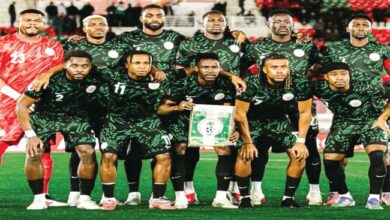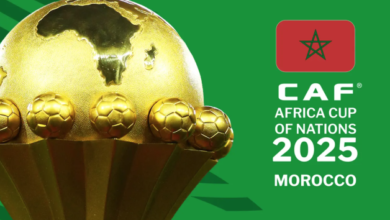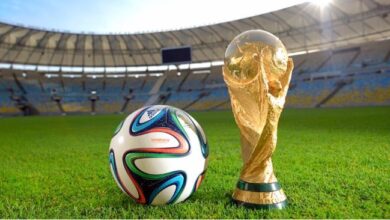Qatar 2022: Off-season football fiesta of controversies, innovation
 By Kayode Adebiyi
By Kayode Adebiyi
On Nov. 20 the world’s biggest football competition, the FIFA World Cup, will kick off in the tiny but oil-rich Middle East country of Qatar.
Between that day and Dec. 18, 2022, 32 countries from six FIFA-affiliated confederations will slug it out at eight venues to decide who lifts the most coveted trophy in world football.
Qatar 2022 has the reputation of being the first FIFA World Cup ever to be held in the Arab world, and the second held in Asia as a whole.
Japan and South Korea jointly hosted the first FIFA World Cup on Asian soil in 2002.
Also, Qatar 2022 will be the last time FIFA will use the 32-team format. At the next tournament to be jointly hosted by North American countries – USA, Mexico and Canada in 2026 – a 48-team format will be adopted.
But as the excitement builds around Qatar 2022, some talking points are dominating discussions and arguments about ‘The World Cup in the Arabian Desert’.
Below, we look at four of them:
Super Eagles missing in action
A few days to kick-off of Qatar 2022, it does not feel like Nigerians are catching the World Cup fever and the reason because the Super Eagles failed to make it to the greatest football fiesta on earth.
The Nigerian senior men’s national football team was beaten to the ticket to Qatar 2022 by their archrivals and West African neighbours, the Black Stars of Ghana, in a two-legged decider.
On March 25, 2022, Nigeria had earned a hard-fought goalless draw in the first leg of their final round qualifiers away at the Baba Yara Sports Stadium in Kumasi, Ghana.
Football enthusiasts back home were optimistic that Super Eagles would finish the job on March 29, 2022, when the return leg would be played at the MKO Abiola National Stadium in Abuja.
Needing a win to book their place, the Super Eagles were held to a 1-1 draw by the Black Stars in a packed stadium set alive by enthusiastic and energetic Nigerian supporters.
As Arsenal midfielder, Thomas Partey’s tame shot went in under goalkeeper Francis Uzoho’s arm for the opener in the 10th minute, the electric atmosphere at the national stadium was replaced by dead silence.
When Willian Troost-Ekong equalised in the 22nd minute, the atmosphere at the national stadium was such that had never been witnessed before. But Ghana held on and secured a vital draw.
It signaled the end of the road for the Nigerian side and a dashed hope of fans watching their team render the National Anthem in their famous green-and-white jersey at the Mundial.
World Cup of controversies
Since 2010, when Qatar won the hosting right the country has been involved in various controversies.
First, there were allegations of bribery and corruption leveled against FIFA executive members which raised serious questions as to Qatar’s eligibility and credibility to host one of the biggest sporting shows on the planet.
Then, there is the issue of human rights violations, especially of foreign workers who trooped into the rich Gulf state as construction workers.
Many rights groups, including Human Rights Watch and Amnesty International, said there is evidence of modern slavery and forced labour targeted at many foreign workers.
In response, the Qatari government reviewed its labour laws to improve working conditions. It also abolished the kafala system.
The system is said to be a repressive way of monitoring migrant workers in the Gulf Cooperation Council member states and some neighbouring countries.
However, many believe that Qatar’s labour reforms did not show much promise in tackling human rights abuses and are responding defiantly to the development.
For instance, Danish apparel makers, Hummel, announced that it would be featuring a faded logo on the Denmark national team jersey to protest human rights violations in Qatar.
Also, the city of Barcelona said that there would be no public screenings of World Cup matches, in spite of Spain’s participation.
Recently, former FIFA president, Sepp Blatter, under whose reign Qatar secured the World Cup hosting right, said awarding the 2022 World Cup to Qatar was a “bad choice”.
“The election of Qatar for the World Cup was a mistake and I assume my responsibility as FIFA president at the time,” he said.
Blatter, whose tenure was eventually consumed by many controversies of its own, also said Qatar is “too small” for the event, and that the selection process did not take “social considerations and human rights”.
Indeed, Qatar will be the smallest country by area ever to host the World Cup since Switzerland hosted it in 1954.
And, for perspective, Switzerland is more than three times the size of Qatar and only needed to host half of the teams Qatar will host.
There are also complaints about Qatar’s strict socio-cultural laws, which critics say contravene the inclusive spirit of the game.
Expensive and lavish World Cup showpiece
By the time the curtains are raised for Qatar 2022, it will be the most expensive FIFA World Cup ever.
According to Economic Times, construction of new stadiums cost over $6.5billion, while investment in driverless metro systems gulped about $36billion.
It is estimated that Qatar has spent something in the region of $300billion as the total cost of infrastructure over the past 10 years.
A contrastive analysis shows that Russia spent a total of $14billion to host the 2018 FIFA World Cup, while it cost Brazil $11.5billion to host the same event in 2014.
With a 2.6 million population, 360,000 of whom are Qatari citizens, the tiny nation has been accused of lavishing its wealth on facilities it won’t need beyond Dec. 18, 2020.
FIFA has also not been spared, as the world football governing body is accused of prioritising money over the passion, spirit and principles of the beautiful game.
But Qatari authorities have said Qatar 2022 will not leave a ‘white elephant’ legacy.
They gave an example of Stadium 974, a demountable energy-efficient venue built with recycled shipping containers, which will be completely dismantled after the World Cup. A similar fate awaits the Education City Stadium.
Disruption of football calendar
Perhaps, of all the controversies Qatar has attracted, the disruption of football calendar is the one with the most telling effect on the most important World Cup personnel – the players.
The weather in Qatar makes it unfeasible for the tournament to be staged in the traditional June-July when professional football in many leagues takes a break.
Domestic competitions, especially in Europe, have to be put on hold for the duration of the tournament.
However, to minimise the disruption of staging the World Cup in November, fixtures before and after the tournament were packed, in addition to other logistical challenges.
Of course, players are the heaviest victims, because they risk picking up injuries in the build-up to the tournament.
There is also the issue of fatigue or burnout, as a result of playing too many games within few days.
Senegal star player Sadio Mane’s fate is hanging in the balance, following an injury he sustained during Bayern Munich’s match against Werder Bremen on Nov. 8.
Other star players that will miss the fiesta due to injury are Diego Jota of Portugal, Paul Pogba of France, Reece James of England, N’golo Kante of France and Georgini Wijnaldum of Netherlands; among others.
(NANFeatures) (www.nannews.ng)












